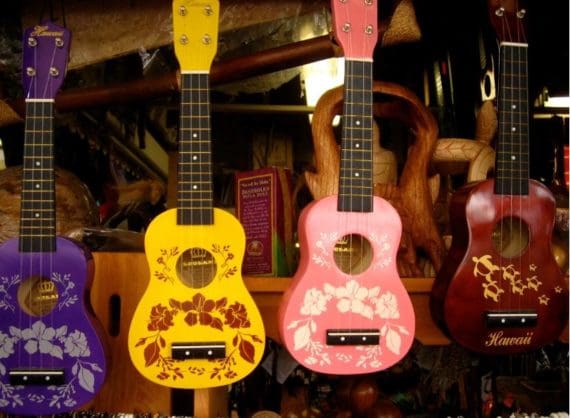Traditional Handicrafts of Hawaii For Authentic Souvenirs

Traditional Hawaiian Handicrafts to Buy On Your Trip – Bring Home Authentic Souvenirs

Image courtesy of Prayitno on Flickr (CC BY 2.0)
Hawaii isn’t only the ultimate vacation destination, but it also happens to be a real paradise for souvenir-shopping. With a wide assortment of authentic items that are sold at Hawaiian markets, in boutiques, souvenir and museum shops, it is really difficult to return home empty-handed.
If you are looking for a perfect Hawaii souvenir, other than usual things like refrigerator magnets, keychains and stickers, read on! We’ve put together a list of five distinctive, hand-crafted souvenirs that promise to keep the spirit of aloha alive long after your return from the lush tropical paradise:
Leis
No one item symbolizes Hawaii better than a genuine, handcrafted flower lei. This floral necklace has been a part of the culture of Hawaii ever since the first settlers arrived from Polynesia by canoe. It has been used in virtually all occasions and given as a sign of welcoming to the Islands, a token of affection and an expression of gratitude. Lei also happens to be one of the most popular and affordable souvenirs to take back home to your family and friends.
 Image courtesy of Jeff Muceus on Flickr (CC BY-SA 2.0)
Image courtesy of Jeff Muceus on Flickr (CC BY-SA 2.0)
Leis are handcrafted using assorted fresh or artificial flowers and plants that are characteristic of Hawaii. These are usually hibiscus, plumeria, pink rose, Spanish moss, mokihana vine and other smaller flowers. More elaborate ones are made with puka shells and kikui nut shells which are often hand-painted with floral or turtle designs. Some leis contain flowers and seeds that cannot be taken out of Hawaii so, when you go shopping, remember to ask the seller which garlands comply with the existing agricultural regulations.
Besides leis themselves, there’s another valuable thing you can take back home – lei etiquette. It is a set of rules for wearing a lei properly that reflects the culture and values of the Hawaiian people. Get informed about these rules while you’re still in Hawaii and you can then present them to your friends and family together with their fragrant flower souvenirs. They will definitely appreciate getting a deeper glimpse into the life on the Islands.
Island jewelry
Nothing will look better against freshly-tanned skin than a beautiful piece of Hawaiian jewelry. Made of naturally-occurring materials such as sea shells, pearls and wood, all the traditional jewelry in Hawaii is inspired by the unique flora and fauna found on the Islands. Back in the 1970s, puka shell necklaces were all the rage, but Niihau shell jewelry is the most prized and sought after today.
Niihau necklaces, bracelets and earrings are made from tiny shells only found on the privately-owned island of Niihau. The shells come in shades of white, brown, red and beige, and very rarely in black, green and blue. It takes hundreds of shells and lots of detailed work to create beautiful jewelry, which is why more intricate items can cost thousands of dollars. Still, simpler necklaces can be purchased for as little as $100 and earrings are very affordable as well.

Image courtesy of Johnny Silvercloud on Flickr (CC BY-SA 2.0)
There is also another type of island jewelry to consider, called Hawaiian Heirloom Jewelry. Usually made of 14K gold and 925 sterling silver, Hawaiian Heirloom Jewelry features engraved floral and island designs and is personalized in black enamel. The jewelry first became popular with the Hawaiian royal family who traveled to England in 1887 for Queen Victoria’s Golden Jubilee. During the trip, Queen Liliuokalani received a personalized gold bracelet from Queen Victoria, which served as inspiration for crafting similar pieces back in the Islands. Today, Hawaiian Heirloom Jewelry is available at a very wide price range, with smaller silver items as affordable as $15.
Hand-crafted quilts
When American missionaries from New England came to Hawaii in the 19th century, they brought their quilt-making talent with them and passed it on to the locals. With time, the locals developed their own quilting style characterized by the use of bold colors and appliqué motifs of large tropical flowers, plants and Islands themes. All of the items produced this way are referred to as kapa – a word which used to stand for a piece of fabric made from tree bark.

Image courtesy of moon angel on Flickr (CC BY-SA 2.0)
A top-of-the-line quilt can cost a lot due to the hundreds of hours and thousands of hand-stitches required to complete one piece. However, there are many affordable quilted gifts you can buy, such as placemats, framed patterns, pillow shams, purses and pot holders.
Koa wood souvenirs
Koa wood is a kind of hardwood available only in Hawaii. Produced from endemic koa trees, it is characterized by rich orange and brown tones and amazing graining that makes every item carved from it highly-prized.

Image courtesy of W Nowicki on Wikimedia Commons (CC BY 3.0)
The koa tree once supplied the islanders with wood for their dugout canoes, but today it is hand-carved into home décor items such as bowls, plates, vases, picture frames and more. Since the koa tree grows only in Hawaii, you can be assured any koa wood items you buy had been handcrafted right there in the Islands. Expect to pay from $20 for smaller items like pendants and keychains to a few hundred dollars for bigger and heavier items like hardwood bowls.
Ukulele
Hawaiian music is distinct from any other music, partly because of the unique sound of the four-stringed instrument ukulele that often backs up the singing. In Hawaiian, ukulele means “the jumping flea” and stories say this name was derived from the way fingers fly over the strings. Ukuleles are great souvenirs to bring back home because they’re small enough to pack in your suitcase and surprisingly simple to learn to play. Pluck a few notes and you’ll be transferred back to Hawaii instantly!

Ukuleles come in all price ranges, but be aware that the price reflects the sound and wood quality, as well as the origin of the instrument. The cheapest and the smallest ones, usually painted in bright colors, are most often produced in China. They don’t have value as musical instruments but can still make for a nice souvenir. A good Hawaiian-crafted ukulele will be in the medium to high price range, anywhere from $40 to a few hundred dollars if made out of koa wood.
Lauhala items
Lau is the Hawaiian word for leaf, while hala refers to a common plant in Hawaii known as Hawaiian screwpine. Together, these two words stand for large hala leaves that are traditionally woven into distinctive Hawaiian gift items. The leaves are first collected and thorns are removed, after which they are soaked to soften. At the end of this process, hala leaves are flexible enough to be woven into hats, placemats, boxes, wallets and other items.
 Image courtesy of R. J. Malfalfa on Wikimedia Commons (CC BY-NC-SA 2.0)
Image courtesy of R. J. Malfalfa on Wikimedia Commons (CC BY-NC-SA 2.0)
Lauhala weaving is a treasured skill in Hawaii and it is handed down from generation to generation. It’s not uncommon to have everyone from the family, from young children to grandparents, involved in handcrafting the tourist gifts. Since the intricacy of woven designs reflects the skills of lauhala craftsmen, items with smaller weave are more prized and also more expensive.
There is no better way to perpetuate your magical visit to Hawaii then by taking a part of Hawaii back home with you. Wearing your beautiful piece of Hawaiian jewelry, using a koa wood bowl to hold fresh fruit, or holding a sing-a-long with you strumming your Hawaiian ukulele are all ways to keep those wonderful memories alive.
***********************************
About The Author:
Lisa is a twenty-something travel and food lover who enjoys sharing her travel tips and experiences with the world. When she doesn’t travel, she pretends to be a sociology student. In her spare time, you can find Lisa perfecting her macaron baking skills or reading a book on women’s issues across different cultures. Twitter: @buff_lisa
***********************************




